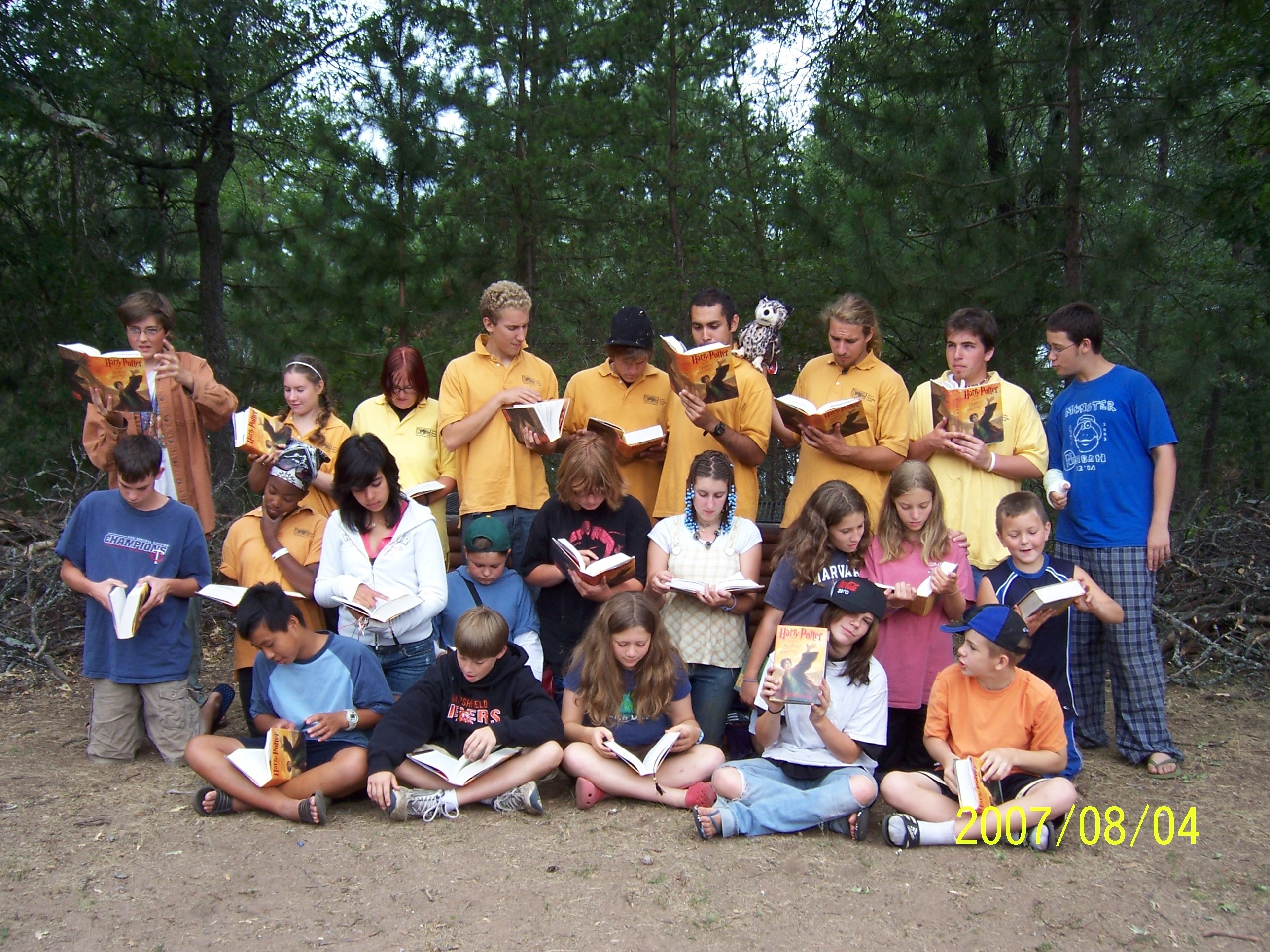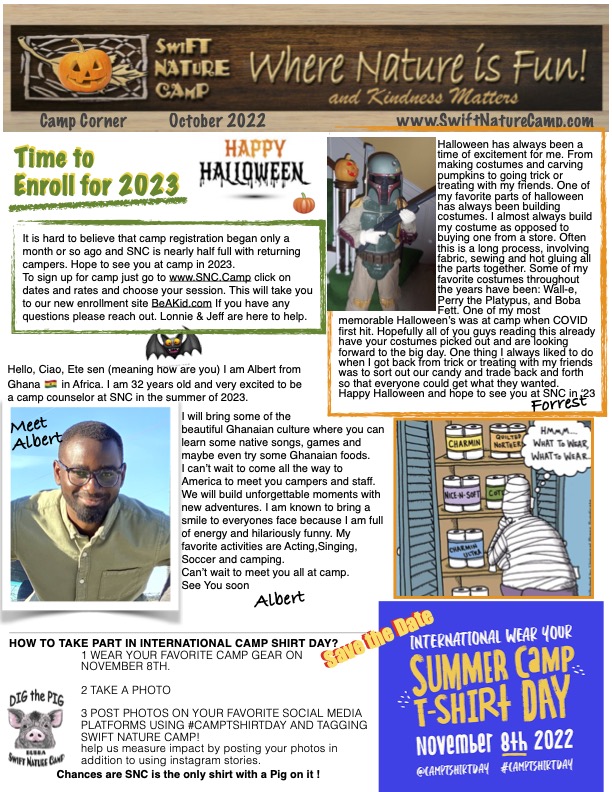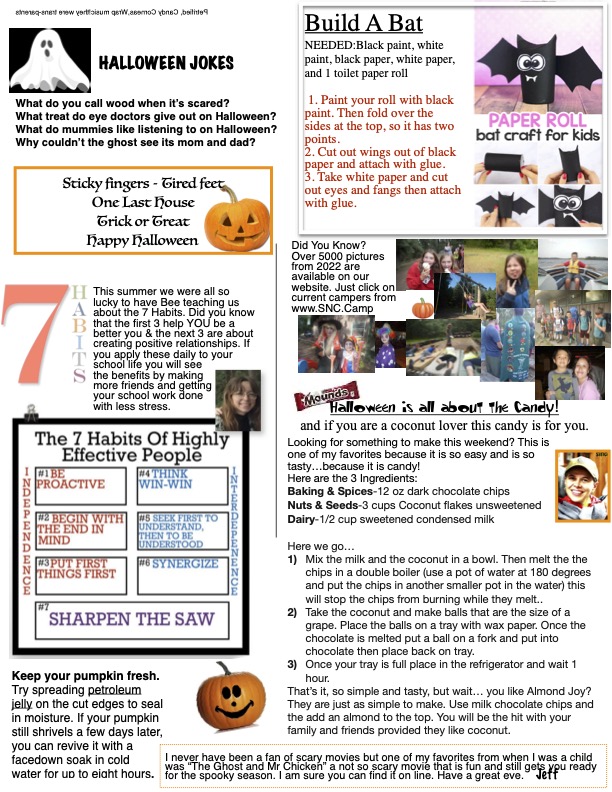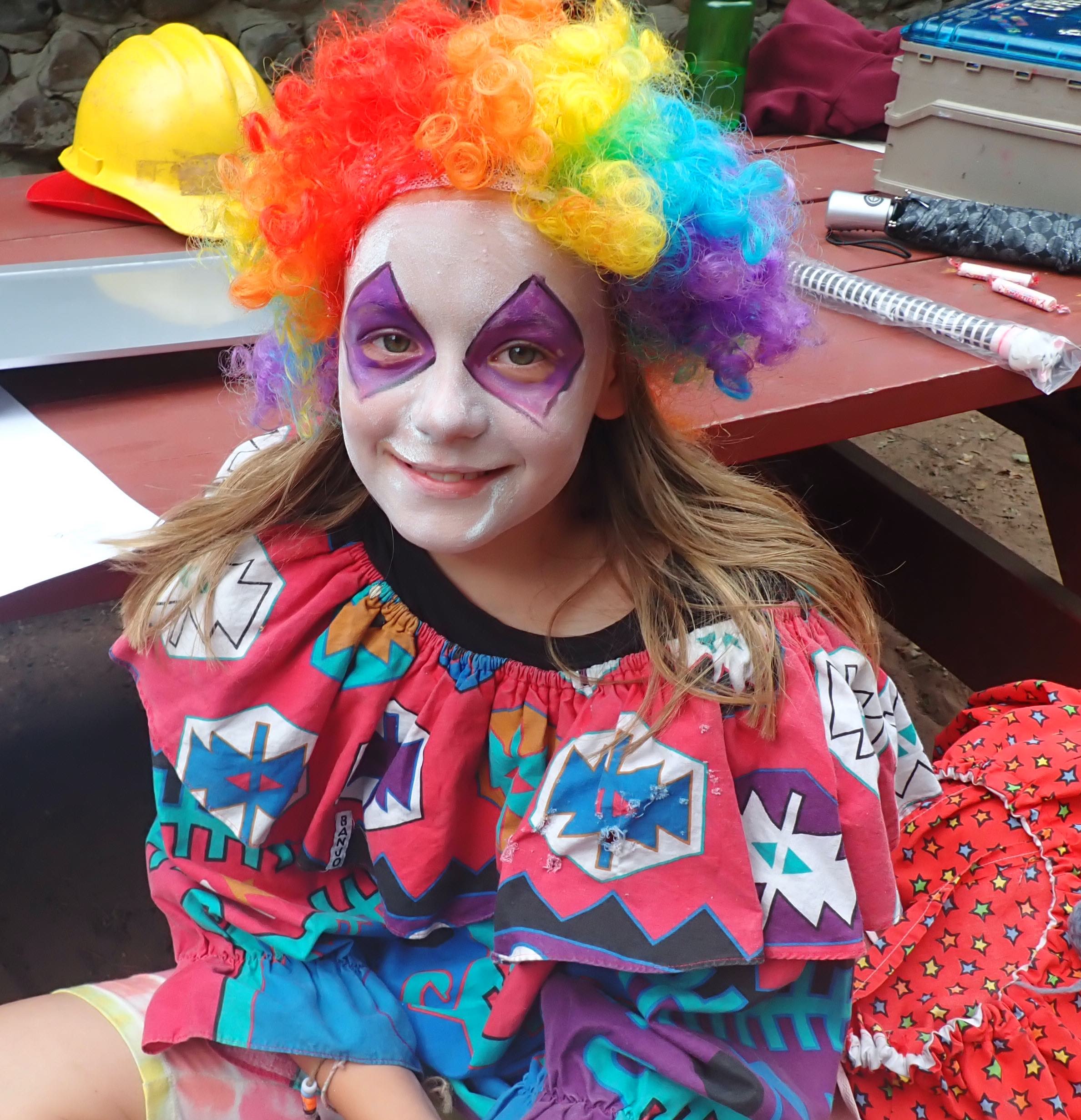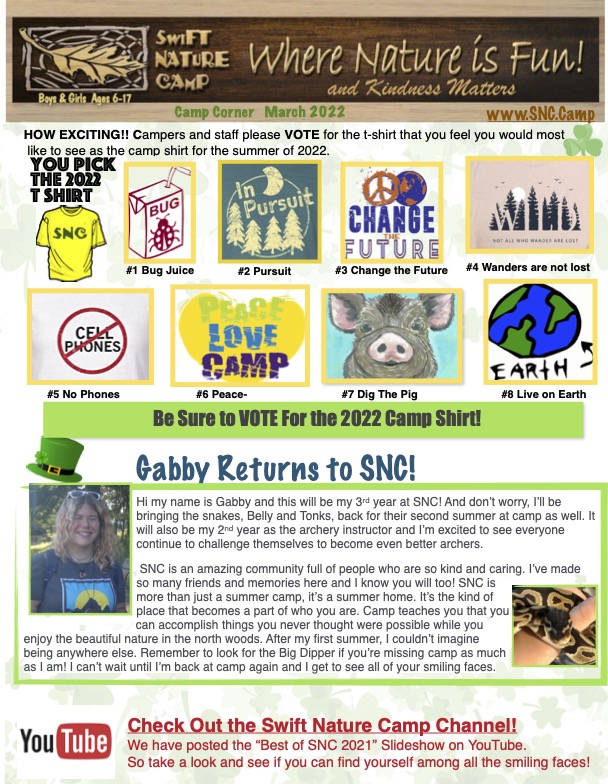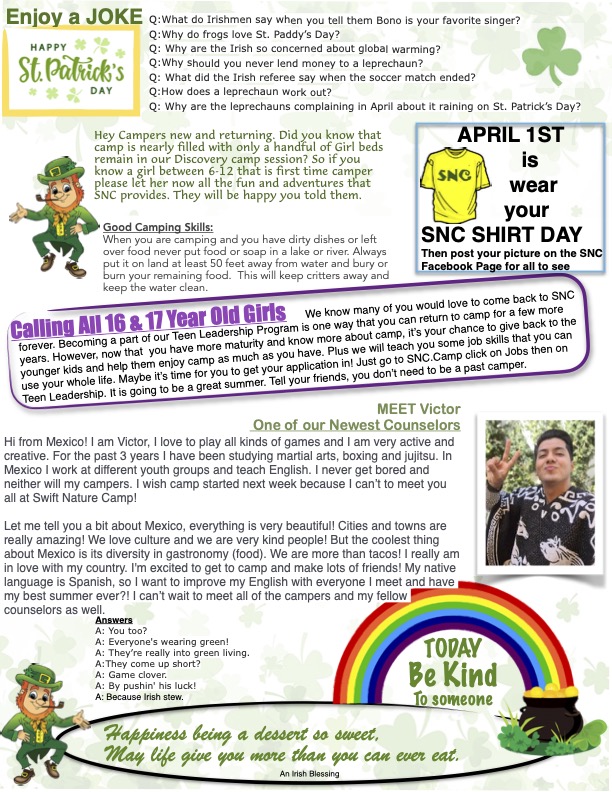Sending a child to overnight summer camp can be a costly endeavor for many parents. The cost of camp fees, transportation, and other expenses can add up quickly, making it difficult for some families to afford. However, there are several ways that parents can save money on the cost of overnight summer camp, including:
Sending a child to overnight summer camp can be a costly endeavor for many parents. The cost of camp fees, transportation, and other expenses can add up quickly, making it difficult for some families to afford. However, there are several ways that parents can save money on the cost of overnight summer camp, including:
-
Consider choosing a camp that is closer to home. Transportation costs can be a significant expense when sending a child to overnight summer camp. Choosing a camp that is closer to home can help reduce transportation costs, as well as make it easier for parents to visit their child during the camp session.
-
Look for camps that offer additional activities or amenities included in the camp fees. Some camps may offer additional activities or amenities, such as horseback riding or water sports, as part of the camp fees. Choosing a camp that includes these activities can help reduce the need for additional expenses and save money in the long run. Learn more at www.SNC.Camp
-
Consider opting for a shorter camp session. Many camps offer multiple session lengths, ranging from one week to several weeks. Choosing a shorter session can help reduce the overall cost of camp, while still allowing your child to have a fun and rewarding summer camp experience.
-
Ask about group discounts. Some camps may offer group discounts for families or organizations that send multiple children to the same camp. If you know other families who are also interested in sending their children to overnight summer camp, consider asking the camp if they offer group discounts and if you are eligible.
-
Consider crowdfunding. Crowdfunding is a popular way to raise money for a variety of causes, including the cost of overnight summer camp. You can set up a crowdfunding campaign on a platform like GoFundMe and ask friends, family, and others to contribute to help cover the cost of camp fees.
In conclusion, there are several ways that parents can save money on the cost of overnight summer camp. By looking for camps that offer discounts or financial assistance, choosing a camp that is closer to home, opting for a shorter camp session, and asking about group discounts, parents can save on the cost of sending their child to camp. Additionally, crowdfunding can be a helpful way to raise money to cover camp fees.
 Sending a child to overnight camp for the first time can be a nerve-wracking experience for parents. It's natural for parents to worry about their child's safety and well-being when they are away from home for an extended period of time. However, there are several things that parents can do to ease their fears and help their child have a positive and enjoyable camp experience.
Sending a child to overnight camp for the first time can be a nerve-wracking experience for parents. It's natural for parents to worry about their child's safety and well-being when they are away from home for an extended period of time. However, there are several things that parents can do to ease their fears and help their child have a positive and enjoyable camp experience.Happy Thanksgiving, see you Summer 2023
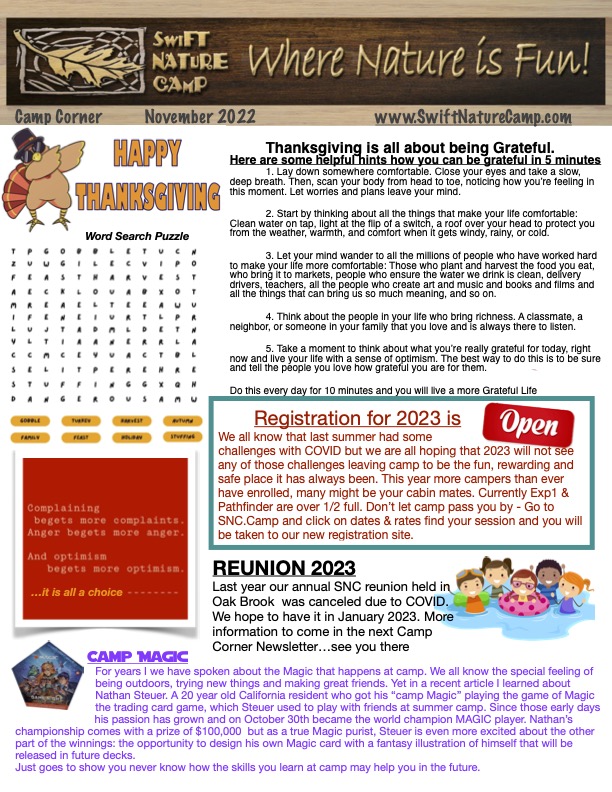
See all the Camp Photos and much more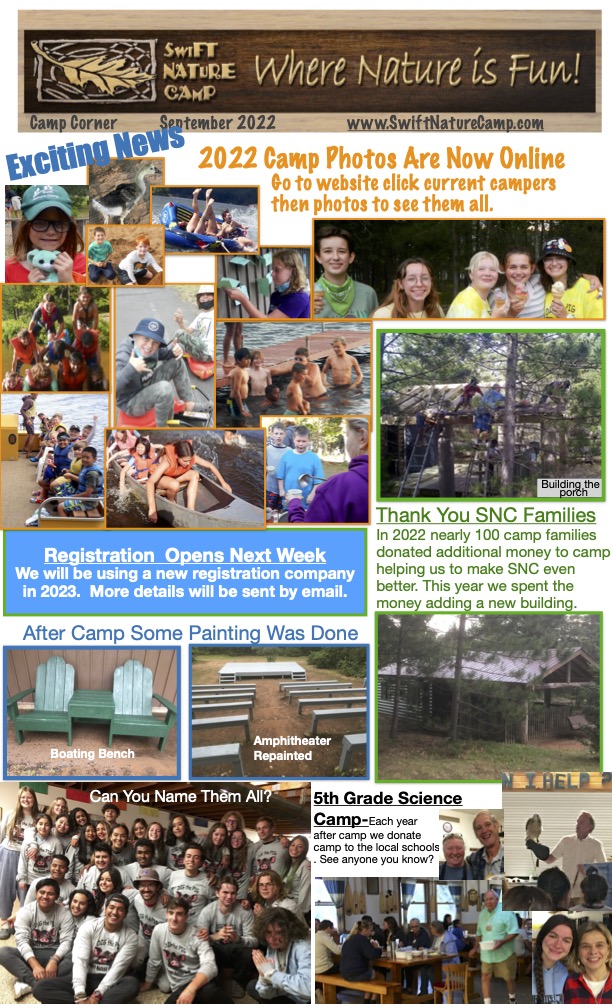
As we all get ready for the summer here is what is happening at SNC.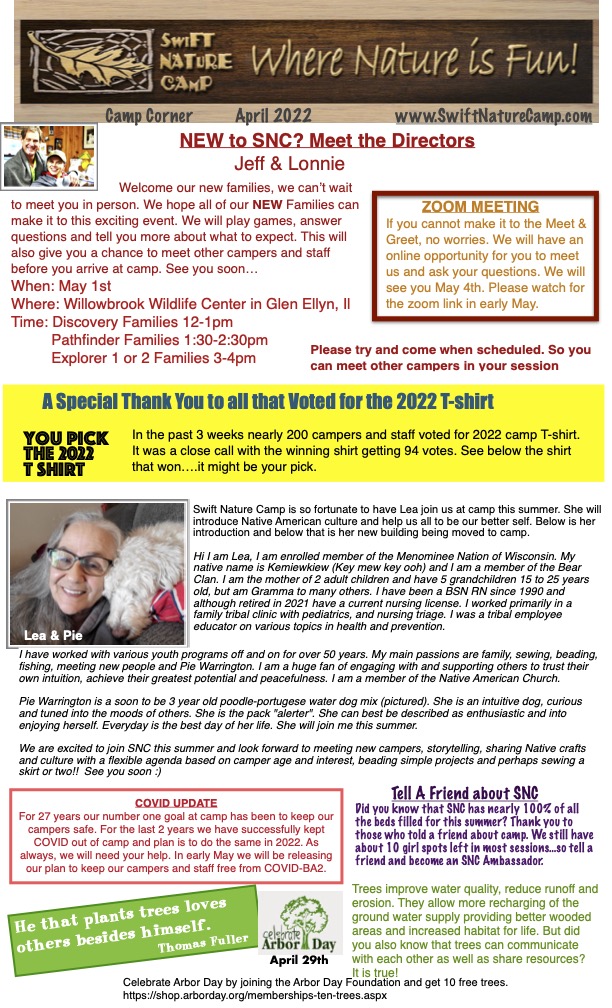
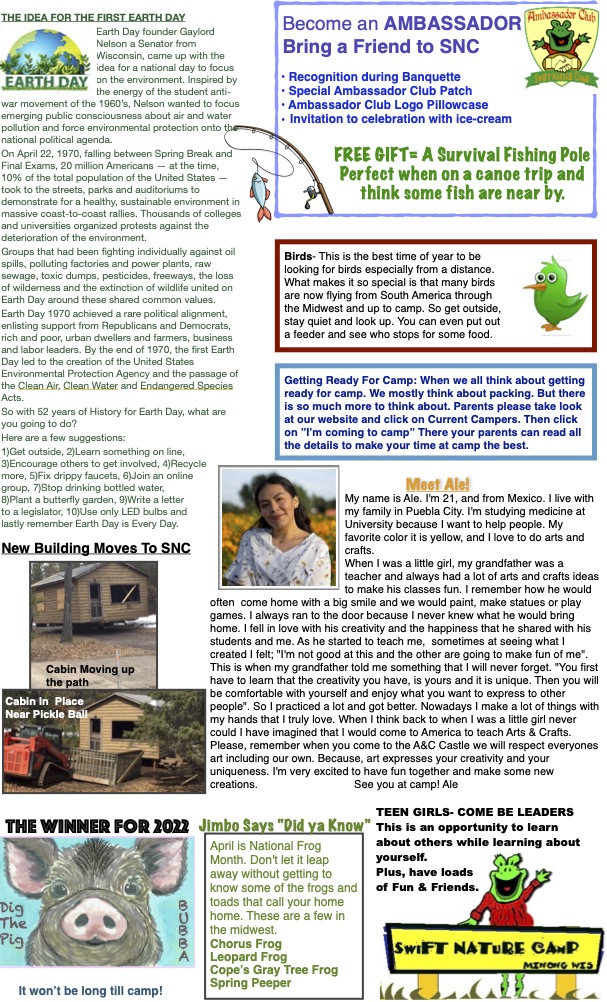
Teen Leadership Camp is a wonderful way for todays 16 & 17 year olds to gain independance, learn leadership and improve social skills all while having a fun time without a screen. Plus, camp often counts as High School Volunter Hours.
To learn all the details click- Teen Leadership Program to learn more about camp click Swift Nature Camp. Be sure to click the parent button on the top of the page to learn more.
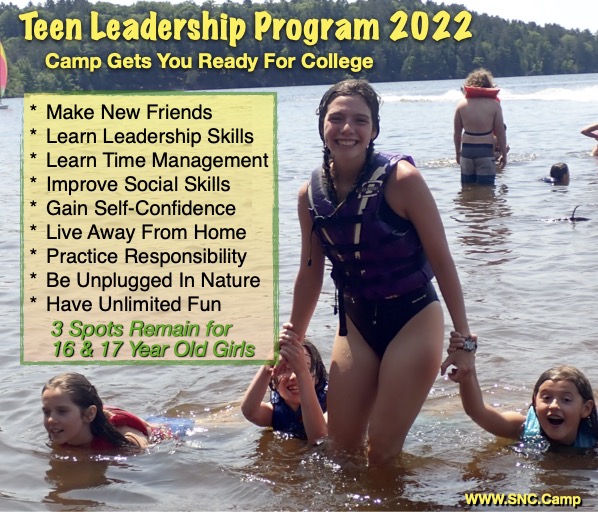
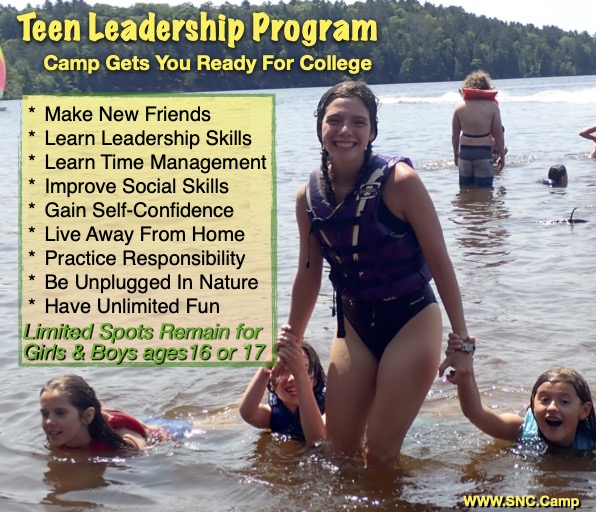
Recently, we came accross the below article in the Washington Post. We found it extremely informative because it highlights the what and the why parents send their children to overnight summer camp. Something we have been wondering for years, because doing so as a parent is counter intuitive. You send your children into the woods to live with a bunch of folks they do not know while your children are directly supervised by college students, it makes no sense. Yet, after one summer parents get it. They see the benefits, children mature and gain independent in ways that can only happen away from home. If you are new to summer camp or a returning parent please read and think how camp this summer, camp will have a positive effect your child.
I send my kids to sleep-away camp to give them a competitive advantage in life
By Laura Clydesdale
May 9, 2016
“Do you even like your children?” the woman I had just met asked me.
The audacity of the question took my breath away. I had been chatting with her, explaining that my kids go to sleep-away camp for two months every year.
I quickly realized two things at once: She was obnoxious, and she actually didn’t care if I missed my kids during the summer. She was talking about something else.
I didn’t have to tell her the reason I “send them away” for most of the summer is because I like them. They adore camp, and it’s actually harder on me than it is on them. I often tell people that the first year they were both gone, it felt like I had lost an arm. I wandered around the house from room to room experiencing phantom limb pain.
Now, instead of being offended, I got excited.
I was going to be able to tell her something that my husband and I rarely get to explain: We do it because we truly think it will help our kids be successful in life. With under-employment and a stagnating labor market looming in their future, an all-around, sleep-away summer camp is one of the best competitive advantages we can give our children.
Huh?
Surely, college admissions officers aren’t going to be impressed with killer friendship bracelets or knowing all the words to the never-ending camp song “Charlie on the M.T.A.” Who cares if they can pitch a tent or build a fire?
Indeed, every summer my kids “miss out” on the specialized, résumé-building summers that their peers have. Their friends go to one-sport summer camps and take summer school to skip ahead in math. Older peers go to SAT/ACT prep classes. One kid worked in his dad’s business as an intern, while another enrolled in a summer program that helped him write all his college essays.
Many (this woman included) would say that I’m doing my children a serious disservice by choosing a quaint and out-of-date ideal instead. There are online “Ivy League Coaches” that might say we are making a terrible mistake.
We don’t think this is a mistake at all. It might not be something to put on the college application (unless my child eventually becomes a counselor), but that isn’t the goal for us.
Our goal is bigger.
We are consciously opting out of the things-to-put-on-the-college-application arms race, and instead betting on three huge benefits of summer camp, which we believe will give them a true competitive advantage — in life:
1. Building creativity.
2. Developing broadly as a human being.
3. Not-living-in-my-basement-as-an-adult independence.
MIT’s Erik Brynjolfsson says, in his book “The Second Machine Age,” that we have reached a pivotal moment where technology is replacing skills and people at an accelerated pace. He argues that creativity and innovation are becoming competitive advantages in the race against artificial intelligence, because creativity is something a machine has a hard time replicating.
The problem is that creativity seems so intangible.
Steve Jobs once said, “Creativity is just connecting things.” He believed that people invent when they connect the dots between the experiences they’ve had. To do this, he argued that we need to have more experiences and spend more time thinking about those experiences.
Indeed. According to Adam Grant’s book “Originals: How Non-Conformists Move the World,” researchers at Michigan State University found that to receive the Nobel Prize, you need deep study in your field and those broad experiences Jobs was talking about. They studied the winning scientists from 1901 through 2005 and compared them with typical scientists living at the same time. Grant writes that the Nobel Prize winners were:
* Two times more likely to play an instrument, compose or conduct.
* Seven times more likely to draw, paint or sculpt.
* Seven-and-a-half times more likely to do woodwork or be a mechanic, electrician or glassblower.
* Twelve times more likely to write poetry, plays, novels or short stories.
* And 22 times more likely to be an amateur actor, dancer or magician.
You read that right. Magician.
It’s not just that this kind of original thinker actively seeks out creative pursuits. These original experiences provide a new way of looking at the world, which helped the prize-winners think differently in their day jobs.
The beauty of summer camp is that not only do kids get to do all sorts of crazy new things, they also get to do it in nature, which lends its own creative boost.
Most importantly, my kids have such intensely packed schedules full of sports, music, art classes, community service and technological stimulation throughout the school year that it makes finding these all-important quiet mental spaces more difficult.
Summers provide a much-needed opportunity for my children to unplug, achieve focus and develop those creative thought processes and connections.
Okay, okay. Creativity might be a compelling tool to beat out that neighbor girl applying to the same college, but what about this “developing broadly as a human being” stuff?
I didn’t come up with that phrase. Harvard did.
William Fitzsimmons, dean of admissions at Harvard, Marilyn McGrath, director of admissions at Harvard and Charles Ducey, with Harvard’s graduate school of education, penned a compelling letter to parents. It practically begs and pleads with them to reevaluate the summer extracurriculars race and to “bring summer back,” with an “old-fashioned summer job” perhaps, or simply time to “gather strength for the school year ahead.”
Fitzsimmons writes, “What can be negative is when people lose sight of the fact that it’s important to develop broadly as a human being, as opposed to being an achievement machine. In the end, people will do much better reflecting, perhaps through some down time, in the summer.”
In terms of “developing broadly as a human being,” summer camp can provide an impressive list of life skills.
Studies over the past decade have shown outdoor programs stimulate the development of interpersonal competencies, enhance leadership skills and have positive effects on adolescents’ sense of empowerment, self-control, independence, self-understanding, assertiveness, decision-making skills, self-esteem, leadership, academics, personality and interpersonal relations.
Now for the cherry on top: Independence.
Michael Thompson, the author of “Homesick and Happy,” has written, “… there are things that, as a parent, you cannot do for your children, as much as you might wish to. You cannot make them happy (if you try too hard they become whiners); you cannot give them self-esteem and confidence (those come from their own accomplishments); you cannot pick friends for them and micro-manage their social lives, and finally you cannot give them independence. The only way children can grow into independence is to have their parents open the door and let them walk out. That’s what makes camp such a life-changing experience for children.”
So, yes, Ms. Tiger Mom, I am letting my children walk out the door and make useless lanyards for two months.
They might not have anything “constructive” to place on their college application, but they will reflect, unwind, think and laugh. They will explore, perform skits they wrote themselves and make those endless friendship bracelets to tie onto the wrists of lifelong friends.
The result will be that when they come back through our door, we’re pretty sure that, in addition to having gobs of creativity and independence, they’ll be more comfortable with who they are as people.
And just maybe they’ll even bring back a few magic tricks.
Laura Clydesdale lives in Berkeley, Calif., with her husband and children. She blogs at lauraclydesdale.com. Follow her on Twitter @l_clydesdale.
Each summer parent want to know the best way to prepare their child for overnight summer camp. We often give advice like: do sleepovers, go with out a phone for a weekend or even practice with what if senerios. But over the 25 years that we have run camp it is often the parents that need to change their mindset about parenting. Parenting is not about keeping your child happy all the time, it is about helping them to overcome adversity and be a productive part of society. The below book we have found to be some of the best when it comes to raising your child to be their best.
THE SUMMER CAMP HANDBOOK: EVERYTHING YOU NEED TO FIND, CHOOSE AND GET READY FOR OVERNIGHT CAMP-AND SKIP THE HOMESICKNESS
By Christopher A. Thurber, Ph.D. and Jon C. Malinowski, Ph.D.
There are many sound suggestions to help children adjust to camp, prepare for leaving home, become more independent, and enjoy the camping experience. The book also includes lists of questions to ask, checklists of things to consider, suggestions for helping children cope and prepare for opening day, and the sidebars are intelligible and helpful.
HOMESICK AND HAPPY: HOW TIME AWAY FROM PARENTS CAN HELP A CHILD GROW
By Michael Thompson, Ph.D.
An insightful and powerful look at the magic of summer camp and why it is so important for children to get away from home….if only for a little while.
BULLYPROOF YOUR CHILD FOR LIFE: PROTECT YOUR CHILD FROM TEASING, TAUNTING, AND BULLYING FOR GOOD
By Dr. Joel Haber, Ph.D. and Jenna Glatzer
This book delivers a practical, supportive, and step-by-step “bully proofing prescription.” It also provides specific steps to help children build resilience, confidence, compassion, and trust.
LAST CHILD IN THE WOODS: SAVING OUR CHILDREN FROM NATURE-DEFICIT DISORDER
By Richard Louv
In Last Child in the Woods, Richard Louv brings together cutting-edge studies that point to direct exposure to nature as essential for a child’s healthy physical and emotional development.
RAISING CAIN - PROTECTING THE EMOTIONAL LIFE OF BOYS
By Dan Kindlon, Ph.D. and Michael Thompson, Ph.D.
What do boys need that they’re not getting? This book illuminates the forces that threaten our boys such as the idea that “cool” equals macho strength and stoicism. Cutting through outdated theories of “mother blame,” “boy biology,” and “testosterone,” the authors shed light on the destructive emotional training our boys receive - the emotional miseducation of boys.
THE CONFIDENCE CODE: TAKING RISKS, MESSING UP, AND BECOMING YOUR AMAZINGLY IMPERFECT, TOTALLY POWERFUL SELF
By Katty Kay, Claire Shipman, and Jill Ellyn Riley
Many girls are consumed by self-doubt on the inside, especially during the tween and teen years, but if they can crack the confidence code, they can learn how to set worries aside and focus their energy on what’s really important: confidently pursuing their dreams and embracing their authentic selves.




